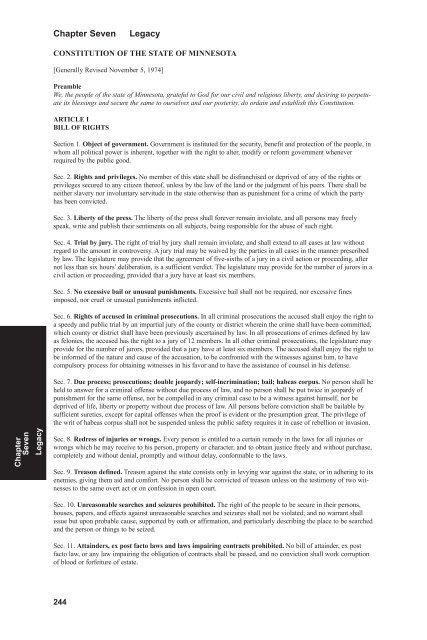Chapter One Federal Government - Minnesota State Legislature
Chapter One Federal Government - Minnesota State Legislature
Chapter One Federal Government - Minnesota State Legislature
Create successful ePaper yourself
Turn your PDF publications into a flip-book with our unique Google optimized e-Paper software.
<strong>Chapter</strong><br />
Seven<br />
Legacy<br />
<strong>Chapter</strong> Seven Legacy<br />
CONSTITUTION OF THE STATE OF MINNESOTA<br />
[Generally Revised November 5, 1974]<br />
Preamble<br />
We, the people of the state of <strong>Minnesota</strong>, grateful to God for our civil and religious liberty, and desiring to perpetuate<br />
its blessings and secure the same to ourselves and our posterity, do ordain and establish this Constitution.<br />
ARTICLE I<br />
BILL OF RIGHTS<br />
Section 1. Object of government. <strong>Government</strong> is instituted for the security, benefit and protection of the people, in<br />
whom all political power is inherent, together with the right to alter, modify or reform government whenever<br />
required by the public good.<br />
Sec. 2. Rights and privileges. No member of this state shall be disfranchised or deprived of any of the rights or<br />
privileges secured to any citizen thereof, unless by the law of the land or the judgment of his peers. There shall be<br />
neither slavery nor involuntary servitude in the state otherwise than as punishment for a crime of which the party<br />
has been convicted.<br />
Sec. 3. Liberty of the press. The liberty of the press shall forever remain inviolate, and all persons may freely<br />
speak, write and publish their sentiments on all subjects, being responsible for the abuse of such right.<br />
Sec. 4. Trial by jury. The right of trial by jury shall remain inviolate, and shall extend to all cases at law without<br />
regard to the amount in controversy. A jury trial may be waived by the parties in all cases in the manner prescribed<br />
by law. The legislature may provide that the agreement of five-sixths of a jury in a civil action or proceeding, after<br />
not less than six hours’ deliberation, is a sufficient verdict. The legislature may provide for the number of jurors in a<br />
civil action or proceeding, provided that a jury have at least six members.<br />
Sec. 5. No excessive bail or unusual punishments. Excessive bail shall not be required, nor excessive fines<br />
imposed, nor cruel or unusual punishments inflicted.<br />
Sec. 6. Rights of accused in criminal prosecutions. In all criminal prosecutions the accused shall enjoy the right to<br />
a speedy and public trial by an impartial jury of the county or district wherein the crime shall have been committed,<br />
which county or district shall have been previously ascertained by law. In all prosecutions of crimes defined by law<br />
as felonies, the accused has the right to a jury of 12 members. In all other criminal prosecutions, the legislature may<br />
provide for the number of jurors, provided that a jury have at least six members. The accused shall enjoy the right to<br />
be informed of the nature and cause of the accusation, to be confronted with the witnesses against him, to have<br />
compulsory process for obtaining witnesses in his favor and to have the assistance of counsel in his defense.<br />
Sec. 7. Due process; prosecutions; double jeopardy; self-incrimination; bail; habeas corpus. No person shall be<br />
held to answer for a criminal offense without due process of law, and no person shall be put twice in jeopardy of<br />
punishment for the same offense, nor be compelled in any criminal case to be a witness against himself, nor be<br />
deprived of life, liberty or property without due process of law. All persons before conviction shall be bailable by<br />
sufficient sureties, except for capital offenses when the proof is evident or the presumption great. The privilege of<br />
the writ of habeas corpus shall not be suspended unless the public safety requires it in case of rebellion or invasion.<br />
Sec. 8. Redress of injuries or wrongs. Every person is entitled to a certain remedy in the laws for all injuries or<br />
wrongs which he may receive to his person, property or character, and to obtain justice freely and without purchase,<br />
completely and without denial, promptly and without delay, conformable to the laws.<br />
Sec. 9. Treason defined. Treason against the state consists only in levying war against the state, or in adhering to its<br />
enemies, giving them aid and comfort. No person shall be convicted of treason unless on the testimony of two witnesses<br />
to the same overt act or on confession in open court.<br />
Sec. 10. Unreasonable searches and seizures prohibited. The right of the people to be secure in their persons,<br />
houses, papers, and effects against unreasonable searches and seizures shall not be violated; and no warrant shall<br />
issue but upon probable cause, supported by oath or affirmation, and particularly describing the place to be searched<br />
and the person or things to be seized.<br />
Sec. 11. Attainders, ex post facto laws and laws impairing contracts prohibited. No bill of attainder, ex post<br />
facto law, or any law impairing the obligation of contracts shall be passed, and no conviction shall work corruption<br />
of blood or forfeiture of estate.<br />
244
















